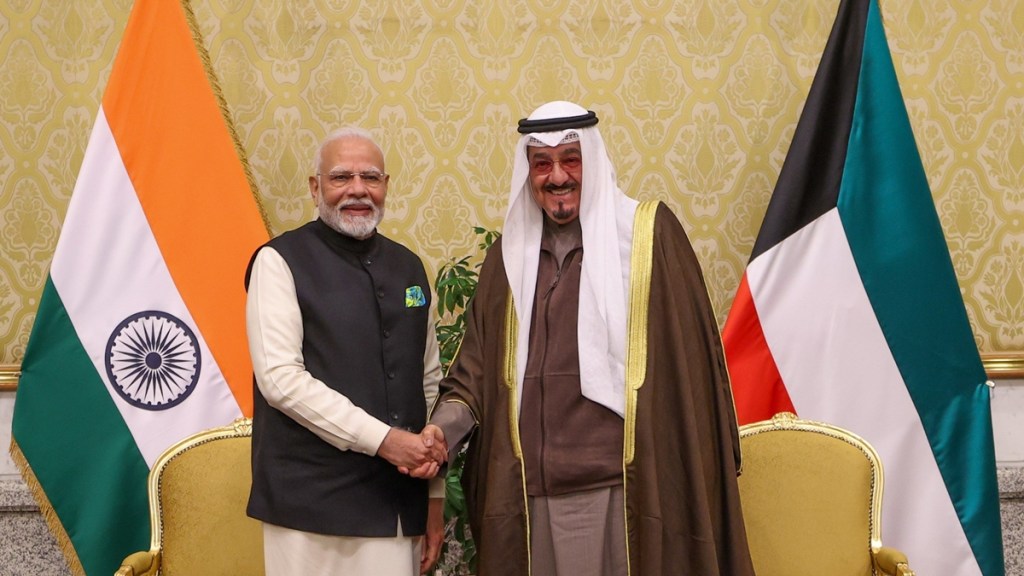With an eye on mutual benefits, India and Kuwait have agreed to elevate their collaboration to a “Strategic Partnership,” reflecting their desire to expand cooperation in diverse fields, ranging from trade and energy to defence and technology. As Kuwait assumes the presidency of the Gulf Cooperation Council (GCC) in 2024, both countries are seeking to build a forward-looking framework for deeper engagement, with key initiatives focused on the Free Trade Agreement (FTA), energy security, and sustainable development.
Strategic Partnership: A New Chapter
The decision to elevate India-Kuwait ties to a “Strategic Partnership” marks a significant milestone in their diplomatic and economic interactions. India’s Prime Minister Narendra Modi congratulated Kuwait’s Amir on his country’s assumption of the GCC presidency, expressing confidence that under his leadership, the India-GCC collaboration would advance in new directions. During talks, both leaders reaffirmed their commitment to deepening ties for the mutual benefit of their peoples and enhancing regional cooperation.
This shift to a Strategic Partnership will create more avenues for joint ventures in key areas, including healthcare, agriculture, transportation, and culture. Furthermore, it is expected to help align both countries’ interests in global forums, where they share concerns over issues such as climate change, energy security, and regional peace. The agreement reflects the growing recognition of each other’s strategic importance in the Middle East and South Asia.
Resuming India-GCC Free Trade Agreement (FTA) Negotiations
Trade has long been a cornerstone of India-Kuwait relations, and the momentum for a broader economic partnership is set to increase with the resumption of talks over the India-GCC Free Trade Agreement (FTA). With the GCC comprising six countries—Saudi Arabia, UAE, Qatar, Kuwait, Oman, and Bahrain—the proposed FTA has the potential to unlock substantial new opportunities for trade, investment, and business partnerships between India and the region.
Both India and the GCC countries have expressed strong support for the agreement, with preliminary documents already exchanged and delegations meeting regularly to pave the way for a final deal. The trade relationship between India and the GCC has grown significantly, with India’s exports to the region surging by 58% in FY 2021-22, reaching over $44 billion. In the same period, India’s total trade with the GCC, including goods and services, saw a remarkable rise to over $154 billion, underlining the economic interdependence between India and its Gulf partners.
The resumption of the FTA negotiations follows previous attempts in the mid-2000s that faced hurdles but is now propelled by a renewed sense of purpose. Both sides are focused on concluding the agreement in the near future, as it promises to streamline trade, remove barriers, and bolster economic growth across sectors such as technology, infrastructure, and manufacturing.
Energy Security: Beyond the Buyer-Seller Relationship
Energy cooperation remains a pivotal aspect of the India-Kuwait relationship, with Kuwait being one of India’s top oil suppliers. However, discussions have shifted from a traditional buyer-seller dynamic to a more collaborative partnership. Kuwait’s role in ensuring India’s energy security is indispensable, providing approximately 3% of India’s crude oil needs and a significant share of liquefied natural gas (LNG) and liquefied petroleum gas (LPG) imports. But both countries are looking to diversify their energy collaboration, moving into upstream and downstream sectors and expanding into renewable energy technologies.
The focus is on forging partnerships that go beyond traditional energy trade to include joint ventures in exploration, refining, petrochemicals, and renewable energy. Notably, the countries are exploring cooperation in green hydrogen and green ammonia, emerging technologies that could redefine their energy future. As India seeks to reduce its carbon footprint, Kuwait’s expertise in energy production and infrastructure will be crucial in supporting these sustainable initiatives.
Additionally, the discussion around Kuwait’s participation in India’s Strategic Petroleum Reserve Program highlights the growing importance of energy security in their bilateral agenda. This partnership ensures mutual interests in energy stability and could create more opportunities for collaborative projects in clean energy and infrastructure development.
Bilateral Trade and Investment: Unlocking New Potential
Trade between India and Kuwait continues to thrive. In FY 2023-24, bilateral trade reached over $10 billion, with India’s exports to Kuwait growing by nearly 35%. India is Kuwait’s sixth-largest supplier of crude oil, a relationship that plays a central role in the economic interaction between the two nations. However, the trade landscape is evolving, with both sides seeking to diversify their commercial exchanges to include more technology, engineering, and high-value products.
The two countries are also focusing on boosting investment flows through agreements such as a Bilateral Investment Treaty (BIT). A BIT would provide a clearer framework for businesses to invest in each other’s markets, particularly in sectors like infrastructure, healthcare, and digital technologies. The growing presence of Indian companies in Kuwait and vice versa offers a promising outlook for future collaboration, especially in sectors where both countries have complementary strengths.
Regional and Global Cooperation
India’s strategic interest in the Gulf region extends beyond economic factors. The growing partnership between India and Kuwait is part of a broader regional cooperation effort with the GCC, which includes important discussions on security, trade, and diplomatic coordination. India views the GCC as a critical partner in achieving regional stability and addressing global challenges such as climate change, terrorism, and economic disruptions.
Kuwait, as the current president of the GCC, plays a crucial role in advancing these discussions. Prime Minister Modi’s just concluded visit to Kuwait, the first by an Indian Prime Minister in 43 years, serves as a clear indication of the strengthening political ties between the two nations. The discussions during this visit covered not only economic issues but also defence cooperation, with India and Kuwait signing a Memorandum of Understanding (MoU) on defence collaboration.
A Vision for the Future
With energy security at the heart of their discussions, India and Kuwait are not only addressing current needs but also preparing for a sustainable future. As both countries continue to deepen their ties, their collaboration will likely serve as a model for the wider India-GCC partnership, fostering greater regional cooperation and contributing to global economic and environmental goals.

